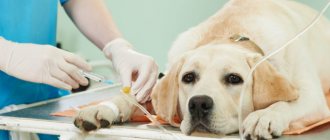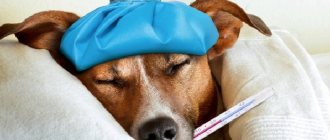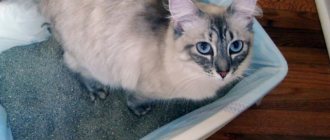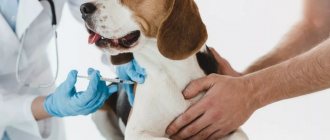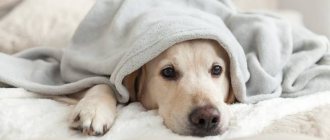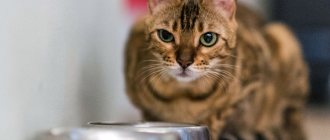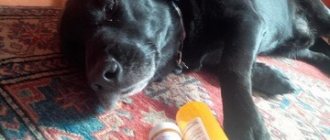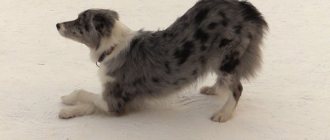Diarrhea in a puppy: how it manifests itself and what is the cause
If we take a closer look at how the canine digestive system works, a healthy pet will have bowel movements 2-4 times a day, usually after eating. But if we are talking about diarrhea, then the dog begins to behave restlessly, whine, and ask to go outside. As for puppies, they will leave puddles of liquid feces right in the house, since his toilet has not yet been established.
The main causes of diarrhea in puppies:
- consumption of low-quality, expired food, as well as products not suitable for feeding dogs;
- eating garbage, slops - babies are very inquisitive, and this behavior is inherent in most small puppies;
- transfer from one type of feeding to another;
- swallowing inedible objects;
- overfeeding your pet;
- manifestation of an allergic reaction;
- infection with worms and other parasites;
- taking medications;
- against the background of diseases of internal organs;
- due to tumor formations, etc.
Owners should be aware that frequent diarrhea is much more dangerous for puppies than for adults, as it can lead to severe dehydration in a short period. Therefore, it is important to ensure that the dog drinks the required amount of water and does not starve for a long time.
Clinical researches
The veterinarian also wants to know what exactly is causing the puppy's yellow diarrhea. To do this, resort to the following types of diagnostic studies:
- Biochemical blood tests . A technique very useful in identifying liver diseases. In particular, the analysis helps determine the amount of liver enzymes. If there are a lot of them, then there is probably something wrong with the puppy’s liver. Thus, biochemistry helps prescribe the correct treatment.
- General blood analysis . If there are a lot of leukocytes in it, this indicates inflammatory processes somewhere in the organs of the digestive system.
- Research into the stool itself . Helps identify parasitic diseases that can also cause yellow diarrhea.
The veterinarian also wants to know what exactly is causing the puppy's yellow diarrhea. To do this, resort to the following types of diagnostic studies:
Hunger diet: why it is needed and how not to overdo it
Until the cause of diarrhea is determined, it is worth putting your pet on a starvation diet. This necessary measure will help not harm the pet. In fact, diarrhea occurs as a result of intense work of the intestinal mucosa. It is responsible for the production of special enzymes that are necessary for the complete digestion and absorption of food. But when the receptors of the mucous membrane are irritated, it begins to work more actively to produce more fluid that washes the affected surfaces.
In order for the “intestines” to wash away irritating elements, it needs much more water than usual, and it takes it from the body. This is why it is important to provide your puppy with enough water. In addition, if during the “cleaning” of the intestines, food enters it, the body will perceive it as a possible threat, and the amount of mucus secreted will increase. This means that diarrhea will become even more frequent and severe.
Another nuance is that the intestines will not have the necessary enzymes to digest food, and in the aquatic environment it will rot. This will naturally increase the amount of poisonous toxins. If you feed your pet solid food during diarrhea, the sharp edges of the pieces can damage the walls of the digestive tract, and then a bloody mixture appears in the feces. The presence of bright red discharge indicates bleeding in the small or large intestine.
For diarrhea in adult dogs, the duration of the fasting diet is 24 hours, but it is not recommended to feed puppies in the first 10-12 hours after the onset of diarrhea. A longer fasting diet is not recommended for children. Thanks to such a forced fast, the intestinal mucosa has the opportunity to get rid of irritation and recover.
If the pet is less cheerful, often spins around at the feet when the owner enters the kitchen, but does not look sick, then there is no need to worry, and the process goes on as usual. The following symptoms should alert you:
- cyanosis of mucous surfaces;
- a significant decrease in body temperature: in puppies of small breeds below 38.5 ° C, medium - 37.5 ° and large - 37.3 °;
- the appearance of tremors, convulsions;
- breathing disorder.
Such signs signal a serious pathology, which became the cause of diarrhea.
Characteristics of types of feces
Although this is not a pleasant experience, it can be useful to examine the stool of a sick puppy.
By their appearance and consistency, you can find out exactly what reasons spurred the development of the disease:
- Pure yellow color indicates increased peristalsis and rapid passage of food masses through the digestive system. Take a closer look at the feces. If, in addition to yellowness, the stool has a high concentration of mucus, this indicates food intolerance. Remember if you have recently changed your pet's diet.
- Yellow-green color of stool . It happens when a puppy eats grass (to cleanse the intestines), as well as with parasitic pathologies, poisoning with rat poison, etc. We advise you to immediately contact your veterinarian if you notice these signs.
- Orange feces . Very often it is a consequence of liver disease. Sometimes this color of feces is due to the too rapid movement of semi-digested food masses through the gastrointestinal tract (bile acids do not have time to darken). It is believed that the orange-yellow color of stool is a reason for an immediate trip to the clinic.
- The yellowish-red color of feces indicates the presence of blood impurities in the stool. The presence of blood clots indicates bleeding in the lower colon. The combination of “red and yellow” is characteristic of blood parasitic diseases and liver pathologies.
- Pinkish-yellow feces with a mucous consistency. If the color of the feces resembles raspberry mousse dissolved in yellow syrup, there is reason to suspect that the animal has hemorrhagic enterocolitis, complicated by liver pathologies. The disease is very dangerous; many dogs die from it every year. We advise you to contact your veterinarian immediately.
- Grayish-yellow , cheesy stool, which smells of some kind of rancidity. Indicates serious digestive disorders when food consumed by an animal cannot be completely absorbed in the body. Very often all this is accompanied by pancreatic insufficiency. Considering this fact, if such feces appear, contact your veterinarian immediately - further delay threatens the development of diabetes. Interestingly, this phenomenon is almost always observed in German Shepherds and Collies. The good news is that if treatment is started promptly, your pet will likely make a full recovery.
- If you can see with the naked eye some inclusions resembling grains of rice in yellow feces, then the cucumber tapeworm (a parasitic cestode) is almost certainly “sitting” in your puppy’s intestines.
It's even worse when periods of yellow diarrhea are followed by pale, pasty stool. This indicates a strong progression of the liver disease that initially caused the yellowing of the feces. The appearance of such feces immediately after yellow diarrhea is often evidence of very rapid intestinal motility, when semi-digested food masses literally “fly out” of the animal’s body almost unchanged.
It is completely normal for a newborn puppy to pass yellow feces. The so-called meconium, that is, original feces, comes out of his body.
Its consistency may vary, but still should not be completely liquid. In the latter case, something is clearly wrong with the puppy.
Yes, it is extremely unpleasant, but you should also pay attention to the smell:
- Puppies often have diarrhea that smells like sour milk. This is often a sign of overeating.
- If there is a disgusting, putrid smell coming from the feces, take the puppy to the vet immediately. This symptom is almost certainly the result of a serious bacterial infection.
Diarrhea due to improper feeding
Feeding a puppy is not an easy task, since while the owner selects the most suitable diet, the dog may develop diarrhea more than once. Often, intestinal upset occurs due to the fact that the pet eats fatty foods - fried chicken, pork, lard, well-oiled pancake and other “delicacies”, even in small quantities, can cause diarrhea.
With minor errors in nutrition, it is easy to resolve the situation. You should put your pet on a dietary diet and, after a short fast, feed the puppy rice water and liquid porridge for 1-2 days - without salt and oil, boiled in water!
If diarrhea is caused by your puppy not eating the right food on a regular basis, you should consult your veterinarian. The doctor will select products that are best included in the diet, help balance the menu and determine the norm. Unfortunately, many dog owners who decide to feed their pets with natural products face similar problems.
When a pet exhibits allergies or intolerance to many foods, the doctor may recommend switching the pet from natural food to a hypoallergenic ready-made food. If the product is suitable, then all the unpleasant symptoms of the puppy, including loose stools, will disappear.
Preventive actions
A dog’s body, including its gastrointestinal tract, works in the same way as a human’s. These animals come from wolves, whose bodies are quite strong and resilient. However, thousands of years of domestication and the work of breeders weakened canine immunity, and the four-legged animals became much closer to their friend and owner - humans.
In this regard, preventive measures to prevent diarrhea are almost the same as in the case of the human body. Namely:
- Feeding (diet). The dog must eat properly and balanced. She may have allergic reactions to certain types of meat, such as lamb or chicken, or dry food. The owner should carefully monitor his pet's reaction to a particular food. The dog should eat various porridges (rice, millet, sometimes buckwheat), boiled eggs, fruits and vegetables. It is imperative to give the animal raw meat, but only clean and high-quality meat, and not rotten pieces. This product is necessary for the body to produce fluoride, which, in turn, retains calcium in the bones and helps its absorption. Without raw meat, a dog's bones and joints will be sore and fragile. It is best to contact a specialist for a detailed description of the diet for each specific breed. Under no circumstances should you give your pet table scraps, as this can cause diarrhea.
- We should not forget about regular vaccinations against infectious diseases. They are as mandatory as a rabies vaccination. They need to be carried out once a year.
- The owner should carefully monitor what kind of feces his pet has, and at the first symptoms, carry out treatment and, if necessary, contact a veterinarian.
- A prophylactic course against parasites should be carried out 2 times a year. You need to remember that the dog “looks” with its nose, so it will definitely inhale the eggs of various parasites hiding in the grass or on the feces of other dogs. Even if the dog is an indoor dog and rarely goes outside, the owner himself can bring worm eggs into the house on his shoes. It is impossible to prohibit an animal from sniffing the ground and everything on it. In addition, dog owners should undergo regular preventive treatment for parasites.
In most cases, a dog’s diarrhea does not go away on its own and only a veterinarian can cure it.
Nutrition Basics for Diarrhea
There are a number of rules that should be followed when feeding a pet suffering from diarrhea:
- you should give the puppy food in small portions, 5-6 times a day, but little by little - this will reduce the load on the inflamed digestive tract;
- products should not irritate the mucous membrane of the stomach and intestines, the sensitivity of which increases significantly during diarrhea. To do this, food must be steamed or boiled;
- The best dishes are pureed or semi-liquid in consistency - they are crushed or ground;
- You cannot give your puppy cold or hot food; it must be heated or cooled to 30-35°C.
If you adhere to similar principles, you can speed up the restoration processes of the stomach and intestinal mucosa, and your pet will feel improvement much faster.
Foods prohibited for diarrhea
The diet of a pet whose digestive processes are disrupted requires mandatory correction. The following products are excluded from the puppy's menu:
- bread - the exception is rye or whole grain crackers, which can be given in small quantities - 1-2 pieces a couple of times a week;
- milk, cream;
- fresh vegetables or canned vegetables;
- fresh vegetables, berries, fruits with sour taste;
- sausages, smoked meats, marinades and pickles;
- mushrooms and mushroom broths;
- sweets and baked goods;
- any legumes.
There is no place for such food on the menu of even a healthy puppy, not to mention a pet suffering from diarrhea. In addition, you should not treat your pet to fried food, food with spices and seasonings. Even if your dog constantly eats dry diets, it is not recommended to feed him such food during diarrhea. This is due to the fact that even the highest quality ones contain a certain amount of fat.
Diarrhea is an unpleasant phenomenon from which small pets are not immune, and owners should be prepared for such “surprises”. It is best to take your “squatting” baby to the veterinarian. But if this is not possible, then you will have to act independently and be sure to take care of the appropriate nutrition for your four-legged friend.
source
Diarrhea of infectious origin
Feeding a pet with diarrhea due to a developed infectious disease, veterinarians prescribe complex therapeutic measures: antibacterial drugs and many other drugs that do not have the best effect on the gastrointestinal tract. For each sick individual, a specialist draws up a personal diet, taking into account the characteristics of the underlying disease and the condition of the body.
One of the main infections that affects dogs is canine distemper. Before feeding an animal, you need to remember a number of certain rules:
- High levels of salt or various spices are not allowed in dog food.
- Fatty pork should be completely excluded from the diet.
- Dogs require alternating intake of meat, cereals and milk.
- Before feeding, the meat is cut into small cubes or passed through a meat grinder.
- Several times a week, you can beat 1 raw egg into the minced meat.
- Dairy products that are indicated for diarrhea: kefir and low-fat cottage cheese.
- Porridges, the most suitable ones being rice and buckwheat, are boiled in water.
In any case, the doctor selects a diet purely individually, and the owner is only required to follow medical recommendations.
For bacterial, infectious diarrhea, veterinarians prescribe Levomycetin, Enterofuril (1 ml for every 2.5 kg), Nifuroxazide, Furazolidone. The dosage, frequency of administration, and duration of treatment are selected by the veterinarian in each specific case.
In addition to treating diarrhea, therapy is aimed at relieving general symptoms and normalizing the condition of the sick animal. Four-fingered patients are prescribed anti-inflammatory, restorative, antibacterial agents, and broad-spectrum antibiotics. To eliminate vomiting - Cerucal, Reglan, other antiemetic drugs.
The duration of treatment can take from four to seven or more days. Do not skip taking medications, do not exceed the dosage indicated in the instructions for the medication. Medicines in tablets are best crushed into powder, mixed with water and poured into the pet’s mouth using an introducer syringe or a regular one without a needle. You can also add them to food or give them with your favorite treat.
We suggest you read: Fattening piglets for meat at home
If the puppy is diarrhea due to helminthic infestation, in addition to the main treatment, complex anthelmintics (IN-AP, prazicide, drontal, milbemax) will be prescribed. For puppies, it is best to purchase an anthelmintic in suspension or in the form of sugar cubes. Such medicines have a pleasant taste, so the treatment will proceed without problems.
What to feed a dog with diarrhea and vomiting
Today, many breeders are concerned with the question - What to feed a dog with diarrhea? However, the answer is not as simple as it might seem at first glance. This is due to the fact that in most cases, diarrhea in a pet is a consequence of one or another gastroenterological disease, which can have both an obvious and hidden course.
If we consider the normal functioning of digestion, then a healthy dog goes to the toilet no more than four times a day after each meal. But, if we talk about pathology, then in the event of diarrhea, the dog begins to whine quite pitifully and with all its appearance shows that it urgently needs to go to the toilet.
In most cases, diarrhea is manifested by a fairly liquid discharge, which contains fecal inclusions. Thus, the question naturally arises of what to feed a dog with severe diarrhea and vomiting, since it is also impossible to keep an animal for a long time without food.
Diagnosis of the disease
In most cases, a dog's diarrhea does not go away on its own and only a veterinarian can cure it. But in order to correctly and adequately prescribe therapy, it is necessary to conduct a complete diagnosis of the animal’s condition.
Unfortunately, collecting an anamnesis when a dog is ill completely excludes a conversation with the patient himself, so the doctor must rely only on the words of the owner and on laboratory and instrumental studies. Diagnostics includes the following activities:
- First of all, a laboratory analysis of stool is carried out, with the goal of detecting parasites or their fragments and eggs.
- A general blood test shows the content of potassium, protein, leukocytes and electrolytes; in addition, based on its results, conclusions can be drawn about the presence of an infection in the dog’s body.
- To determine the performance of the liver, kidneys and other organs, a biochemical blood test is performed.
- A urine test can determine the condition of your kidneys.
- X-ray of internal organs located in the abdominal cavity can help detect bleeding or a foreign body in the gastrointestinal tract.
- PCR analysis helps determine viral or bacterial infection.
In each individual case, additional studies may be needed to clarify the diagnosis, form and severity of the identified disease. This is necessary in order to increase the effectiveness of treatment and use drugs with targeted, narrow action, which do not destroy the mucous membrane of the gastrointestinal tract and have minimal side effects. Such analyzes include:
- bacterial culture, revealing sensitivity to the antibiotic;
- cytology, which determines the type and type of parasite or bacteria;
- serological test to determine the type of infection;
- ultrasound examination of the abdominal organs;
- X-ray using a dye isotope, used to determine peptic ulcer disease;
- examination of a dog's esophagus and rectum using endoscopy and colonoscopy, respectively;
- identification of toxins in the blood that cause diarrhea.
Why can diarrhea occur in dogs?
Most often, when a dog eats poorly and has diarrhea, this can be most directly related to instability in the animal’s diet. Thus, the most common causes of such a pathology as canine diarrhea are the following:
- the dog is fed with food that has expired long ago;
- a sharp change in the type of feeding (when natural food changes to dry food and vice versa);
- possible swallowing of an object by a pet that is not food;
- excessive feeding of the dog;
- the presence of sweets, fats or smoked meats in the dog’s diet;
- allergic reactions associated with intolerance to a particular type of product;
- the presence of worms and other parasites in the animal’s body, which, in addition to diarrhea, can cause feelings such as nausea, the dog vomits, or blood is observed in the feces;
- the use of various medications that are not approved by the veterinarian;
- pathologies of the internal organs of the animal;
- cancerous tumors of the gastrointestinal tract;
- inflammation of the pancreas;
- Stressful situations can also cause your puppy to experience uncontrollable diarrhea.
So, what should you do if your pet has fairly persistent diarrhea? This question very often remains unanswered, and many owners wait until the disease goes away on its own or try to adjust the dog’s diet. In any case, if any ambiguous situation arises, you must immediately seek help from a veterinarian, since such an upset stomach can be dangerous and will result in permanent dehydration of the pet’s body.
Diseases of newborn puppies
Hypothermia (as well as overheating) is one of the most dangerous factors threatening the life of newborn puppies. As already noted, for the puppies to function normally, it is necessary to maintain an optimal temperature in the nest. In the first week of life it is 20°C; Depending on the type of coat, fluctuations of 1.5°C are permissible.
If the puppy’s body temperature is below the age norm, then this is hypothermia. In this case, it must be warmed up urgently. It is best to place the puppy against your own body under a sweater or jacket. It takes a long time to warm him up: for example, if the body temperature is 34.4 0C, then warming up will take two to three hours.
Under no circumstances should puppies be warmed up quickly using a hot heating pad, as the skin vessels expand and additional heat loss occurs from the surface of the body, as a result the puppy has to expend additional energy. A chilled puppy should not be fed either mother's milk or artificial food, since the stomach and small intestines will not be able to cope with the load in this case.
Insufficient weight gain. Normally developing puppies gain weight daily, and by 8-10 days their weight doubles. If the puppy does not gain weight, you need to carefully examine him and find out the reason. If there are several such puppies in the litter, then we can assume that the problem is in the mother (toxic milk, inflammation of the uterus, insufficient milk production).
The puppy may be born underdeveloped (hypotrophic). Such puppies at birth have a low weight (25% lower than that of their littermates), they have underdeveloped muscles and subcutaneous tissue, shallow breathing and they suck inactively. Their ability to thermoregulate is even less advanced than that of normal puppies.
Such puppies are artificially fed and raised in an incubator. A sudden drop in weight accompanies diarrhea, which is associated with loss of water from the body. In this case, it is urgent to replace the loss of water and electrolytes, otherwise the puppy will die from dehydration. To combat dehydration, Ringer-Locke solution mixed in half with a 5% glucose solution is used. The dose is 1.8 ml per 100 g of body weight per hour. The solution is poured from a bottle, syringe or pipette.
It is more effective to administer this mixture subcutaneously. At the same time, the puppy is warmed up. Puppies that are not gaining weight due to lack of food whine, tremble, and look lethargic. Such puppies are immediately transferred to artificial feeding and warmed up, since dehydration quickly occurs with insufficient nutrition.
Hypoglycemia (low blood glucose levels) is most often observed in toy puppies between 6 and 12 weeks of age. This condition is usually preceded by stress: change of place of residence, transportation, etc. Symptoms arise unexpectedly: the puppy refuses to eat, chills, apathy, and indigestion appear.
Attention! This condition is very dangerous and can result in seizures and death of the puppy. Therefore, treatment must be started immediately to avoid the death of the animal! If the puppy’s consciousness is preserved, a 5-10% glucose solution, honey solution or sweetened water is poured into his mouth. The condition should improve within half an hour.
Disorder of the gastrointestinal tract due to errors in feeding. A normally developing puppy gains weight daily, looks calm, and has normal stools - hard, yellowish in color. Usually there is stool after each feeding. Underfeeding or overfeeding bottle-fed puppies immediately affects the nature of their stool and the frequency of bowel movements.
The first sign of overfeeding is loose stools. If overfeeding is insignificant, then the stool is yellow in color. With severe overfeeding, it acquires a greenish color, due to the presence of unchanged bile due to the accelerated movement of food masses through the intestines. In these cases, it is sufficient to dilute the feeding mixture with water in a 1:1 ratio.
After the color and consistency of the stool are restored, the concentration of the mixture is gradually adjusted to the original concentration. If overfeeding was prolonged and there was a violation of the enzymatic function of the intestines, then the diarrhea becomes gray. The most severe condition is when food is not digested at all, then feces resemble curdled milk.
Toxic milk syndrome: In some cases, milk from lactating bitches can be toxic. One of the main causes of illness in bitches: inflammation of the uterus or mastitis. This can also be caused by taking drugs or medications. When puppies get into their bodies with milk, toxins cause digestive upset.
This is usually seen in puppies between 3 and 14 days of age. The most typical symptoms are diarrhea and bloating. These puppies whine, look exhausted, and may drool. In the case of toxic milk syndrome, puppies are immediately weaned from the bitch and transferred to artificial feeding.
Cardiopulmonary syndrome or neonatal circulatory failure is observed in puppies during the first five days of life. It is caused by various stressful situations, to which newborn puppies are very unstable (cold, overheating, insufficient milk, etc.). All this causes a drop in temperature, respiratory rate and heart rate.
We suggest you read: Hoof diseases in cows Joint diseases
As a result, food digestion is disrupted or stops completely. If the body temperature drops to 34.5 °C and below, then there is an even greater depression of vital functions, which soon becomes irreversible. To prevent the death of puppies, immediate measures must be taken to normalize vital functions.
The symptoms of cardiopulmonary syndrome, regardless of the cause, are the same: puppies begin to drool, they scream, and make swallowing movements. Puppies become weak very quickly, stop moving and lie on their sides. The heart rate is reduced to 40 beats per 1 minute, and the respiratory rate is reduced to 4 times per 1 minute.
Attention! Cardiopulmonary syndrome requires emergency medical care!
Inflammation of the umbilical cord. The umbilical stump can become a gateway to infection in newborns. The reasons for its inflammation are the treatment of the navel after the birth of the puppy with contaminated instruments or dirty hands, an insufficiently clean environment for the newborn, or diseases of the mother’s teeth (if she chewed the umbilical cord).
An inflamed navel looks red, swollen, and may fester. Since the navel vessels are connected to the liver, this condition poses a real threat to the health and life of the puppy - he may develop sepsis. The navel is treated with hydrogen peroxide and antibiotic ointment. If necessary, the doctor prescribes antibiotics orally or intramuscularly. A sick puppy can pose a danger to littermates, as it is a carrier of the infection.
The puppy screams, his stomach is swollen and tense. Subsequently, the abdomen swells even more and becomes hard as a board. The skin of the abdomen acquires a dark red or bluish tint, which indicates the development of peritonitis. The puppy develops chills, weight loss, and dehydration. The disease very quickly ends in the death of puppies.
Puppy herpesvirus infection is an acute, non-febrile infection of newborn puppies, usually occurring before 14 days of age. Infection occurs during the passage of the mother's birth canal. The virus develops at low body temperature (less than 36.7°C). Hypothermia contributes to the development of the disease.
The puppies stop sucking, scream, they develop chills, bloating (the abdomen is painful and soft), and the stool is liquid and yellow-green in color. Coordination of movements may be impaired. There is no cure. Animals die within 24 hours after the onset of the disease. Infected puppies raised in an incubator may survive if their body temperature is above 7.8 °C. Recovered puppies may develop kidney failure by 8-10 months. No vaccine has been developed for the herpes virus.
A “swimmer” puppy. Normally developing puppies begin to stand at the age of two weeks, and walk confidently by the age of three weeks. If the puppy does not begin to walk within this time frame, then he will be a “swimmer”. These puppies have their limbs turned outward and resemble sea turtles. This pathology can be congenital (especially in cocker spaniels) and acquired (in obese puppies of breeds with massive bones). Slippery floors contribute to the development of this pathology. As a rule, the pathology is incurable.
Features of proper treatment
In order to understand what is happening to the dog, it is initially necessary to assess how difficult the pet’s health situation is. If the disease occurs in a bitch after giving birth, this situation can be quite effectively corrected by changing the dog’s diet and completely eliminating dairy products from it.
If a dog consumes a very large amount of fat, it may also experience a certain intestinal disorder, which can be corrected with a special diet. To do this, you can offer your pet freshly cooked low-fat rice or other dietary food.
Sometimes a dog gets diarrhea from natural food.
In this case, it is worth consulting with a veterinarian and switching the animal to dry, balanced food.
It is also worth noting that if your pet has diarrhea with blood, vomiting, fever or other alarming symptoms, then you should immediately consult a doctor, since such a phenomenon can be dangerous not only for the health of the dog, but also for her life.
As for independent treatment, if the situation is not critical, you can try to eliminate the pathology on your own. Thus, you can give your pet half a tablet of no-spa medication in order to relieve the spasm. However, regarding the advisability of other medications, it is necessary to consult a veterinarian so as not to harm the animal by self-medication.
Age-appropriate causes of diarrhea
Frequent loose stools for a day or more indicate serious problems in the baby’s body - it could be poisoning or a virus.
Acute diarrhea that lasts more than 2 days is a serious reason for a full examination to identify diseases.
Newborns are having fun
The breeder must carefully monitor the condition of the newly whelped bitch and her offspring. It happens that newborn puppies develop eating disorders - usually the reasons are as follows:
the kitten does not accept mother's milk or reacts poorly to what the mother has eaten;
an allergic reaction to artificial nutrition is detected;
E. coli, streptococcus or staphylococcus;
a virus transmitted from the mother.
Elimination of any of the causes requires the intervention of a veterinarian. It is prohibited to independently treat a bitch and her offspring - even the simplest disease can kill babies in a few hours if treated incorrectly. Therefore, if there is the slightest problem, the breeder should contact the clinic.
A puppy at 1 month
Diarrhea in a 1 month old puppy can be caused by:
poor nutrition (early introduction of complementary foods);
the presence of infection in the body;
parasitic infestations (fleas or helminths).
First of all, complementary feeding is changed to specialized wet food. If the stool disorder does not stop, we are talking about more serious cases. Infections with parasites or viruses must be treated by a doctor.
In a puppy at 2 months
It happens that completely independent puppies experience indigestion, including loose stools. Diarrhea in a puppy at 2 months is caused by the following:
excessive gluttony - most children do not have a feeling of satiety, the problem is especially acute in small breed dogs;
poor nutrition – bad food or stale natural food;
the presence of worms in the body;
Therapy for puppies of this age is carried out with medications under the supervision of a veterinarian. Self-treatment is dangerous - it risks overdose, intoxication, or simply ineffectiveness.
If the kitten is simply overeating, reduce the amount of food eaten at a time.
Puppy 3 months or older
During this period of life, the pet becomes completely independent. He studies everything around him that could affect his health: injuries, poisoning or infections are not uncommon. In addition, at the age of 3-4 months, dogs' teeth change, which can also cause loose stools. Diarrhea in a 3-4 month old puppy can also appear after vaccination.
Treatment for your pet depends entirely on the diagnosis. To alleviate the animal’s condition, you can give sorbents, for example, Smecta or Polysorb, but only after you have consulted with a veterinarian about the dosage.
Proper dog diet
If a dog begins to go to the toilet with a lot of liquid feces, this is not evidence that it is sick with anything. Most often, such situations may arise due to the fact that the pet’s food is not of the required quality, or the pet may eat something during a walk, which is completely undesirable.
Thus, after vomiting and diarrhea appear, you should refrain your animal from consuming food for at least twelve hours.
However, we should not forget that it is very important that the dog consumes a sufficient amount of clean water.
Also, on the recommendation of a veterinarian, you can give your pet anti-diarrhea medications, which are used to stop diarrhea and other manifestations of intestinal disorders as much as possible.
Based on this, it is necessary to highlight the main products that can be given to your pet so that he stops diarrhea and vomiting:
- boiled lean meat;
- low-fat fermented milk products;
- Mashed potatoes.
It is imperative to exclude the following harmful foods from your pet’s diet:
- cold fatty foods;
- fried or smoked;
- raw meat;
- milk.
For the most part, dietary food for dogs is similar to the food that people use for diarrhea. It is imperative to exclude the consumption of dry food, since even the highest quality of them contain a certain percentage of fat, which can have a detrimental effect on the general condition of the animal.
Why is diarrhea so dangerous for babies?
The danger of diarrhea for puppies is that, along with liquid feces, nutrients that are so necessary for growth and maturation are washed out of the body. If a puppy has loose stools, this can lead to intoxication and dehydration (dehydration), which, in turn, provokes various disorders.
In addition, the water-electrolyte balance, metabolic processes, acid-base reactions are immediately disturbed, and dehydration quickly occurs. With normal functioning of the intestines, approximately 55-70% of the incoming fluid is absorbed into the body, and with diarrhea it is almost completely excreted in the feces. Wherein:
look exhausted, lethargic;
the condition of their fur deteriorates;
mucous membranes become dry;
the body's immune strength decreases.
Prolonged dehydration is fraught with coma, death and is very dangerous for the health of a small pet, especially for miniature breed dogs. Even with one-time diarrhea, it is important to feed your pet to maintain fluid in its body.
If diarrhea is due to infection
If the veterinarian has determined that the cause of diarrhea is an infection, then comprehensive treatment for this condition is required. For the most part, in addition to dietary nutrition, special antibacterial agents are prescribed, which direct their action to destroy the infection.
If we consider the most severe infectious disease that can cause diarrhea, it is canine distemper. Thus, when organizing dietary meals, it is necessary to take into account the following basic recommendations:
- Eliminate salt consumption by your pet as much as possible;
- It is worth reducing your dog’s consumption of spices or hot seasonings;
- fatty meat and fish should also be avoided as much as possible;
- meat that is offered to animals must be strictly lean and always well boiled;
- all food should crumble very finely and must be thermally treated before consumption;
- when the animal’s condition begins to improve, boiled eggs can be introduced into food;
- Among dairy products, preference is given only to low-fat cottage cheese or kefir.
Based on all of the above, we can conclude that non-infectious diarrhea in animals is a condition that can be easily eliminated with the help of a proper diet.
source
Causes of diarrhea
Indigestion and its consequences in the form of diarrhea are far from a harmless disorder. It is worth understanding that diarrhea caused by some reason will not go away on its own, and the dog’s condition will worsen. Unfortunately, in most cases, diarrhea is only a symptom of a disease that has already reached the digestive system. A relatively harmless condition can only be considered diarrhea caused by stress, and even this statement is doubtful.
Conclusions about how to treat and whether you can feed a dog with diarrhea will vary greatly depending on the causes of the disease. Diet changes and special diets can really help if diarrhea and other gastrointestinal problems are caused by poor diet. For example, if a dog is fed bones and suffers from a disorder, once they are removed from the diet the situation will improve significantly. Of course, a lot depends on the time during which the disorders occurred, the state of metabolism and the health of the dog in general.
A fairly common mistake that leads to the development of diarrhea is feeding too much after hunger or a sudden change in diet . The owner picks up a puppy on the street or buys it from a breeder. A pet that appears in the house is surrounded by care and receives a variety of treats. The puppy’s digestive system is not ready for sudden changes and the expected reaction occurs - a disorder develops. Attributing what is happening to adaptation, the owner continues to feed the puppy with diarrhea, which aggravates the situation even more.
Important! All new foods should be introduced into the puppy’s diet gradually and in small portions.
Diarrhea is a natural reaction when eating:
- Large amounts of food (overeating).
- Spoiled products.
- Treats from the owner's table.
- Leftover food on the streets.
- Some caught insects.
- Poisonous plants - in this case there is also a threat of poisoning.
In all of the above cases, abrupt relief of diarrhea is contraindicated. By producing large volumes of mucus, the body protects the intestinal walls and cleanses itself. You should not intervene abruptly in the process even if diarrhea has become one of the symptoms of an allergy. In this case, the more important goal is to detect and eliminate the product that caused the body's severe reaction. However, you should not let the development of the disease take its course. If the allergen is not eliminated in time, diarrhea will worsen. which will lead to large volumes of fluid loss and dehydration.
Note! Diarrhea should be considered as a complex problem or symptom, since it rarely acts as an independent disease.
Before diagnosing your pet with diarrhea, you need to make sure that he is not suffering from constipation. This is also a digestive disorder, but it causes stool to accumulate in the intestines and not pass out naturally. Most often, the condition develops due to a lack of fluid, the feces become too dry, compressed and hard. With constipation, the intestines also produce a large amount of mucus and it comes out of the anus. This condition is usually called false diarrhea.
What to do if your puppy is diarrhea
Therefore, you need to adequately assess the situation and understand what caused and provoked diarrhea in the dog.
Causes of diarrhea in puppies:
- poisoning from low-quality feed, stale food, chemicals;
- unbalanced diet;
- too fatty foods (smoked meats, fatty meat);
- metabolic disorder;
- teething, changing teeth;
- autoimmune diseases;
- intolerance to any food components;
- indigestion, consumption of poorly digestible food, products from our table;
- habitual overeating;
- intestinal infections (colibacillosis, dysbacteriosis);
- viral, bacterial, invasive diseases;
- neoplasms in the digestive tract.
Diarrhea in puppies can be caused by an allergic reaction to any irritant, foreign objects in the gastrointestinal tract, severe stress, or a sudden transition to a new type of diet.
A sudden change in diet and routine often leads to indigestion. Therefore, diarrhea may be a consequence of the introduction of new products or occurs when changing food, for example, when switching to natural food from ready-made industrial food.
Loose stools in a puppy are observed with pancreatitis, liver and kidney failure, hypovitaminosis, and respiratory ailments (ARVI). Diarrhea in a healthy puppy at 4 months is most often caused by the change of baby teeth.
Profuse diarrhea, diarrhea with blood, water, mucus is one of the characteristic symptoms of viral, bacterial, fungal, parasitic infections (canine distemper, enteritis, hepatitis, leptospirosis).
One of the most common causes of diarrhea in a puppy of 2-3 months or in older dogs is a helminthic infestation. Worms (helminths) not only consume useful substances supplied with feed and food, but also violate the integrity of tissues and mucous membranes in the gastrointestinal tract, which leads to malfunctions in their functioning.
We suggest you read: Scabies in cats, causes, symptoms and treatment
If the stool has an unpleasant odor, the stool contains mucus, undigested food particles, blood, diarrhea gives way to constipation, the dog loses weight, rest assured, your pet is infected with endoparasites.
Stomach upset in one-month-old puppies can be caused by milk. Puppies receive immune protection, nutrients, and vitamins from their mother's milk. Therefore, if a lactating bitch is sick, weakened, or receives a poor-quality, unbalanced diet, this will affect not only her health, but also the condition of the babies.
With slight overfeeding, the excrement has a yellowish color, with severe overfeeding it has a green, bright yellow color, which is explained by the presence of unchanged bile in the feces. Caused by too rapid movement of feed through the intestines. Gray liquid stool indicates a violation of enzyme activity, which is caused by overfeeding.
In a one-week-old puppy, an upset stomach may signal infection with streptostaphylococcal infection or E. coli (dysbacteriosis). Escherichia coli is a conditionally pathogenic microorganism that lives in the digestive tract, but under the influence of negative factors it manifests its pathogenicity and multiplies quickly, which leads to the development of enteritis and colibacillosis. These diseases are most often diagnosed in weakened puppies or in overfed “artificial” puppies.
Intestinal infections in one- to two-month-old puppies occur quite aggressively, in an acute form, and can cause the death of the entire litter. Therefore, treatment must be carried out immediately. The veterinarian will prescribe the medications and treatment course based on the diagnostic results and the root cause.
Answer the following questions:
- Whether the pet was switched to a new diet or received familiar foods.
- What kind of bowel movements were there yesterday, the day before yesterday.
- How long ago was deworming and immunization carried out?
- Has the puppy had contact with other animals (stray cats, dogs, birds).
- Could the dog pick up something on a walk?
Let us remember that bloody diarrhea, diarrhea with mucus in combination with vomiting, lethargy, nausea, refusal to eat, and other symptoms require a qualified approach to treatment. In this case, call a veterinarian at home or take your pet to the clinic.
If there is no vomiting, the puppy responds adequately to stimuli, is cheerful, does not refuse food, the temperature is normal and most likely the cause of the dog’s loose stool is overfeeding, poisoning with stale food, treatment can be carried out at home. First of all, put your pet on a 12-24 starvation diet. Representatives of miniature and dwarf breeds, as well as newborn puppies, should not be fed for more than 6-10 hours.
In this case, the pet must have constant access to fresh drinking boiled water. If your pet refuses to drink on his own, pour water into his mouth in small portions through a regular syringe without a needle. Water can be replaced with sweet tea and herbal teas.
Even if the dog begs for food, treats, any food is prohibited on the first day. Especially if there is mucus in the excrement. Eating food can trigger vomiting and will only make the situation worse.
To normalize the electrolyte balance and replenish fluid loss in the body, give the puppy Regidron solution. The dosage depends on the age and weight of the dog. In severe advanced cases, infusion therapy is performed. Physiological solutions (isotonic glucose, Ringer-Locke solution) are administered intravenously to puppies.
Sorbents will help relieve intoxication and the effects of toxins:
- Activated carbon (1 tablet per 10 kg of weight).
- Smecta.
- Polysorb.
- Enterosgel.
The above remedies can also be used for diarrhea of unknown etiology. The main thing is to follow the dosage and carefully monitor the dog’s condition.
If intestinal spasms or strong peristalsis occur, Papaverine and No-Shpu can be diluted in water. Smecta also quickly relieves spasms in the gastrointestinal tract. In addition, the drug adsorbs toxins, neutralizes viruses and bacteria. The dosage and frequency of administration depend on the frequency, nature of bowel movements, age, and weight of the puppy. After dissolving the sachet in warm water, 2-4 month old puppies are given 0.3-0.5 ml several times a day.
For diarrhea, you can give your dog potato starch (dissolve a tablespoon in warm water), a decoction of oak bark, chamomile, St. John's wort, sage, and yarrow. These simple and affordable remedies have an astringent, anti-inflammatory effect. If the puppy has diarrhea, the symptoms of diarrhea are quickly relieved by steep rice water.
For severe profuse diarrhea, having correctly calculated the dosage, give the dog Loperamide, Imodium. To normalize beneficial populations of intestinal microflora, the puppy will be prescribed enzyme agents, prokinetics, probiotics (Lactovit, Linex, Hilak Forte, Mezim, Pancretin, Enterol, Lactobacterin, Lactobifadol).
